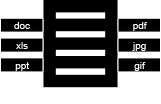Translation is Key for eDiscovery
Depending on the scope of the litigation case in question, the number of documents to which the eDiscovery requirements apply may run into the hundreds, hundreds of thousands, or even millions of pages. In the case of litigation brought against Japanese companies, much of this information will be written in Japanese. It must therefore be translated in order for US lawyers to be able to peruse it.
Processing large volumes of translations, however, is impractical and indeed impossible for most law firms, from the perspective of both time and cost.
Honyaku Corporation’s eDiscovery Translation Service: 7 Benefits
-
-

Specialist legal translation
Our eDiscovery translation is finished to a high quality in order to meeting the exacting standards required by legal professionals. We are one of only a handful of translation companies able to add clear and quantifiable value to international litigation cases between Japan and the US.
< Projects & Performance >
-
Attorneys, Judicial Scriveners, Chartered Accountants, Tax Accountants
eDiscovery, corporate charters, internal corporate rules, contractual documentation, legal commentary, certified copies of commercial registration, certificates of official seal registration, judicial precedents, written complaints, trial documentation, verdicts, national legislation & regulations, etc.
-
Private Companies
Internal use: rules of employment, HR guidelines, compliance, corporate governance, etc.
External use: contractual documentation (see below), documentation relating to annual shareholder meetings, IR-related documentation, assets-related documentation, documentation related to judicial action, etc. -
Public Offices
Legislation and regulation in Japan and other countries, judicial precedents, legal procedures in target countries, news related to the judicial branches of governments, information available online, etc.
< eDiscovery Projects>
- Department of Justice investigation: electronics/home electronics manufacturer; automotive-related manufacturer
- Unfair Competition Prevention Act/Corruption case: trading house
- Product liability claim: electronics manufacturer
※Other projects include litigation involving pharmaceuticals manufacturers and cases brought by the International Trade Commission
-
-

On-demand translation service tailored to eDiscovery
eDiscovery translations are led by experienced managers well versed in the requirements of such projects.
Our range of services includes translation support designed to match the needs of each specific stage of eDiscovery. z,
- Translation of search terms, to enable drill down to those documents requiring translation
- Translation of reviews and protocols that form the basis of guidelines for review work
- Spot translation of key documents during the review phase to speed up project progress
- Human translation of so-called “hot docs” to ensure quality and accuracy
- Bulk discounts offered for large projects to keep costs manageable
-

24-hour project support through synchronized Japanese and US teamwork
Project teams are set up in both Los Angeles and Tokyo, working back-to-back to ensure seamless progress and delivery on deadline.
We can also provide local support in the US for any mission critical requirements from lawyers working on the relevant litigation.
-
-
-

Optimal project team set up from among 1,200 registered translators
We maintain a database of approximately 1,200 registered translators, from which we select the best suited and most qualified members to set up a bespoke team as soon as the project begins.
This wealth of human resources allows us to undertake extremely large-scale projects, even those requiring 100-plus specialist translators to work simultaneously to ensure timely completion. -

Delivery of specialist professional support tailored to litigation content
The translation of eDiscovery documents goes beyond the basic linguistic process of translating Japanese into English.
It requires additional specialist knowledge, which will vary according to the nature of the litigation, be it patent infringement, product liability litigation, violation of anti-monopoly laws, or an investigation being conducted by an official government body or department.
In this sort of translation, it is critical that technical and specialist terms are translated with total accuracy. This is the key to delivering a high quality service.
The scale of our business and our significant industry experience means that, whatever the nature of the litigation, we will be able to bring on board specialist translators with expert knowledge in the relevant fields, thereby ensuring that quality and accuracy are maintained.
-
-
-

Capable of handling the diverse file format requirements of eDiscovery
In addition to editable file formats, such as Word, Excel, and PowerPoint, the team can also work with non-editable formats, such as locked PDFs, and image files such as TIF, GIF, and JPG. The layout of non-editable files will be reproduced accurately to ensure that the translated version is equivalent to the original.
-

Exhaustive risk management to prevent data leakage or loss
Maintaining the confidentiality of our clients’ projects is of utmost priority to us.
All project team members are required to adhere to a set of strict security guidelines. For eDiscovery, these guidelines include the following:- Project team members are required to sign a separate confidentiality agreement for each eDiscovery project they work on (agreements can be tailored to match confidentiality agreements prepared by the client)
- Document transfer is conducted using a secure FTP site (documents are never sent as email attachments since this presents the risk of leakage or loss)
- Project team members are required to sign an agreement compelling them to destroy all project-related data on project completion. We also conduct follow-up checks to ensure that all relevant data has been correctly destroyed.
-




